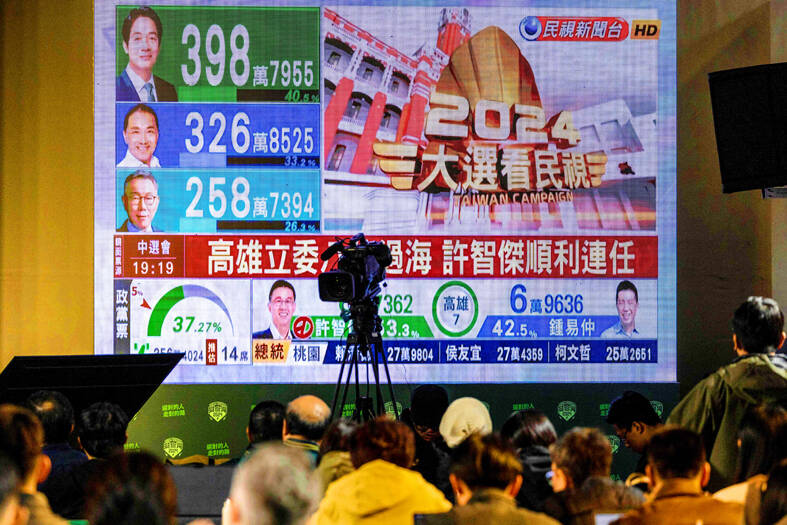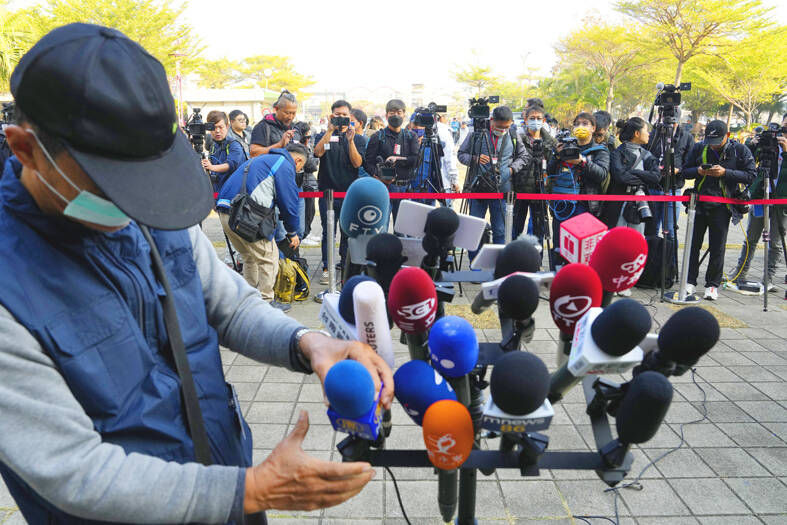While the Democratic Progressive Party (DPP) yesterday won the presidential election, political watchers said that it faces an unprecedented three-way split in the Legislative Yuan that might see the formation of the first non-partisan Cabinet, which would also be a first for the Taiwan.
Pundits said that once Vice President William Lai (賴清德) takes office, he would face a tough time in the legislature, as the DPP has lost its majority.
The DPP won 51 legislative seats, the KMT won 52 and the TPP eight.

Photo: Alastair Pike, AFP
The DPP, which had held a majority in the 113-seat body since 2016, had a net loss of 11 seats, dropping from 62 and losing its position of dominance.
Lai would have a tougher time than former president Chen Shui-bian (陳水扁), whose presidency from 2000 to 2008 coincided with a KMT legislative majority, academics said, adding that Lai must think about how he will interact with a three-way split in the branch.
Political commentator Huang Yang-ming (黃揚明) said that Lai would have to learn how to make compromises with the other parties.

Photo: Ng Han Guan, AP
During an international news conference announcing his victory, Lai said he would look into measures to appoint people to positions without partisan bias.
The three-way split in the legislature highlights the need for communication, participation and collaboration among all parties, Lai said, adding that he would mull measures on how to incorporate the policy platforms of the KMT’s presidential candidate, New Taipei City Mayor Hou You-yi (侯友宜) and Taiwan People’s Party Chairman Ko Wen-je (柯文哲).
Hou would be forced to consider how to mend relations with DPP supporters as he continues his mayoral term, Huang said, adding that the outcome of the presidential election might have terminated Hou’s political career.
Winning over the younger generation and the KMT’s cross-strait policy remain key factors in how the party would remain politically relevant, Huang said.
The TPP will have to consider how it fosters its support base for another presidential bid, he said.
Meanwhile, Reuters reported that Lai would have limited ability to pass legislation without a legislative majority.
He could appoint a Cabinet with some opposition or non-party figures to show that he is willing to reach across the political aisle to get laws passed, it reported.
However, the opposition might not want to play ball, it said.
China, which had portrayed the presidential election as a choice between war and peace, might be mollified that Lai, unlike President Tsai Ing-wen (蔡英文), will not have free rein to do what he wants, the report said, adding that it might not react too strongly to his election victory.
China could hold back until Lai’s inauguration speech on May 20, but might initiate some form of military response or increase its economic coercion in response to his victory, it said.
Lai is a “known quantity” for the US, having served as vice president since 2020, and he has repeatedly pledged not to change the “status quo” across the Taiwan Strait and offered talks with China, it added.
Lai and Tsai reject Beijing’s sovereignty claims over Taiwan, and say Taiwan is already an independent country and its people should decide its future, it said.
The presidential election is seen as having “real and lasting influence on the geopolitical landscape,” said Gabrielle Reid, associate director of the global intelligence consultancy S-RM.
“The outcome of the vote will ultimately determine the nature of ties with China relative to the West and will have a strong bearing on the state of play in the South China Sea,” she said.
Additional reporting by Yang Cheng-yu, CNA and AP

RESPONSE: The transit sends a message that China’s alignment with other countries would not deter the West from defending freedom of navigation, an academic said Canadian frigate the Ville de Quebec and Australian guided-missile destroyer the Brisbane transited the Taiwan Strait yesterday morning, the first time the two nations have conducted a joint freedom of navigation operation. The Canadian and Australian militaries did not immediately respond to requests for comment. The Ministry of National Defense declined to confirm the passage, saying only that Taiwan’s armed forces had deployed surveillance and reconnaissance assets, along with warships and combat aircraft, to safeguard security across the Strait. The two vessels were observed transiting northward along the eastern side of the Taiwan Strait’s median line, with Japan being their most likely destination,

‘NOT ALONE’: A Taiwan Strait war would disrupt global trade routes, and could spark a worldwide crisis, so a powerful US presence is needed as a deterrence, a US senator said US Senator Deb Fischer on Thursday urged her colleagues in the US Congress to deepen Washington’s cooperation with Taiwan and other Indo-Pacific partners to contain the global security threat from China. Fischer and other lawmakers recently returned from an official trip to the Indo-Pacific region, where they toured US military bases in Hawaii and Guam, and visited leaders, including President William Lai (賴清德). The trip underscored the reality that the world is undergoing turmoil, and maintaining a free and open Indo-Pacific region is crucial to the security interests of the US and its partners, she said. Her visit to Taiwan demonstrated ways the

GLOBAL ISSUE: If China annexes Taiwan, ‘it will not stop its expansion there, as it only becomes stronger and has more force to expand further,’ the president said China’s military and diplomatic expansion is not a sole issue for Taiwan, but one that risks world peace, President William Lai (賴清德) said yesterday, adding that Taiwan would stand with the alliance of democratic countries to preserve peace through deterrence. Lai made the remark in an exclusive interview with the Chinese-language Liberty Times (sister paper of the Taipei Times). “China is strategically pushing forward to change the international order,” Lai said, adding that China established the Asia Infrastructure Investment Bank, launched the Belt and Road Initiative, and pushed for yuan internationalization, because it wants to replace the democratic rules-based international

RELEASED: Ko emerged from a courthouse before about 700 supporters, describing his year in custody as a period of ‘suffering’ and vowed to ‘not surrender’ Former Taiwan People’s Party (TPP) chairman Ko Wen-je (柯文哲) was released on NT$70 million (US$2.29 million) bail yesterday, bringing an end to his year-long incommunicado detention as he awaits trial on corruption charges. Under the conditions set by the Taipei District Court on Friday, Ko must remain at a registered address, wear a GPS-enabled ankle monitor and is prohibited from leaving the country. He is also barred from contacting codefendants or witnesses. After Ko’s wife, Peggy Chen (陳佩琪), posted bail, Ko was transported from the Taipei Detention Center to the Taipei District Court at 12:20pm, where he was fitted with the tracking